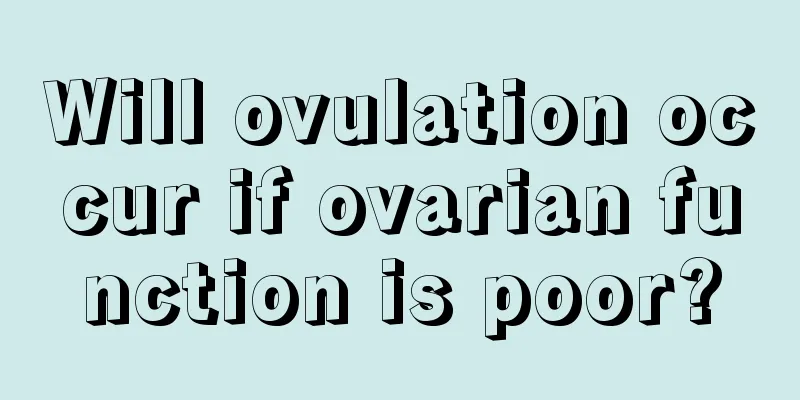Will ovulation occur if ovarian function is poor?

|
In our lives, many women's ovarian function is not particularly good. Poor ovarian function can cause many diseases and have a serious impact on women's ovulation. Because when the ovarian function gradually declines, ovulation may no longer occur, and slowly enter the situation of premature ovarian failure and menopause, that is, women age rapidly in a short period of time. Will poor ovarian function affect ovulation? Can I still ovulate if my ovaries are in poor function? Decreased ovarian function does not mean that ovulation will not occur. Therefore, people with decreased ovarian function have a chance of getting pregnant if they have good ovulation, good fallopian tubes, endometrium, and male semen. However, we often see in clinical practice that people with decreased ovarian function are prone to ovulation problems. For example, follicular hypoplasia means that they may not ovulate normally every month. Or, although the follicles can develop, they do not grow very large. They ovulate when they grow to 14 mm (here we refer to the average diameter), or 15-16 mm. At this time, if we measure the hormone level, we will find that the estrogen level is low. In this case, we call it small follicle ovulation, which also affects pregnancy. If such a situation is found clinically through B-ultrasound monitoring, the patient should be promptly advised to consider ovulation induction when necessary, or to take further examinations and treatments in combination with other medical histories, so that they can become pregnant as soon as possible within their limited childbearing age. Causes of ovarian dysfunction 1. Immune factors: Most immune diseases such as immune thyroiditis, type 1 diabetes, lupus erythematosus, rheumatoid arthritis, etc. may cause premature ovarian failure. 2. Surgery: Removal of both or one ovary before the age of 40 may cause dysfunction of the ovaries and other tissues, leading to premature ovarian failure. 3. Some viral infections: For example, the mumps virus, which often causes reproductive problems in men and women, can cause ovarian inflammation, ovarian damage, and premature ovarian failure. 4. Amenorrhea: It is a common clinical condition with no obvious cause and occurs as secondary amenorrhea. It usually occurs during the childbearing age and gradually leads to infrequent menstruation, amenorrhea and menopausal symptoms such as hot flashes and irritability. 5. Excessive weight loss: Rapid and improper weight loss will cause a sharp decrease in body fat. When the fat ratio is too low, it will lead to estrogen deficiency. The decrease in estrogen will cause menstrual disorders and amenorrhea, and then inhibit the ovulation function of the ovaries, which can easily cause premature ovarian failure. 6. Chocolate cyst: If the ovaries are always in a state of blood stasis and inflammation, it will also lead to limited ovulation function of the ovaries and affect ovarian function in the long term. |
>>: Symptoms of ovarian hyperstimulation
Recommend
Is it painful to do intrauterine adhesion surgery?
If the patient has intrauterine adhesions, or oft...
After undergoing myopia surgery, can I still stay up late to watch the World Cup?
The 2022 Qatar World Cup is in full swing, and th...
Learn more about juvenile Parkinson's disease
Parkinson's disease is the third killer of th...
What is the ranking of Sichuan's 21 cities and prefectures? What is the relationship between Sichuan Province and Chongqing?
Sichuan, referred to as "Chuan" or &quo...
Symptoms of early pregnancy: lower abdominal pain
Women will experience a series of uncomfortable s...
Brown blood flowing down there
In life, there are always some women who have mor...
What should I do if my period is still not over after half a month?
Once a woman's menstrual period has not ended...
Can patients with high blood pressure exercise? Please don’t do these three types of exercise!
Many people suffer from high blood pressure It is...
How to do B-ultrasound to check whether you are pregnant
Nowadays, many young couples often have unexpecte...
Reasons why menstruation has not come yet
Nowadays, people's diet is becoming more and ...
Can I soak my feet in a cold uterus?
Everyone needs to develop good living habits and ...
Ectopic pregnancy B-ultrasound diagnosis picture
Every woman hopes that her pregnancy process will...
Feeling dizzy and having pain in the neck? Don't ignore it, it may not be cervical spondylosis
Mr. Li is a 45-year-old senior corporate manager....
Can't stand the pain in your cervical spine? Huaxi doctors teach you two simple tricks that you can do at any time
Now this era No cervical spondylosis I am embarra...
Can girls who “love to laugh” also suffer from depression?
Author: Wu Meitong Guangzhou Women and Children&#...
![[Health Care] Detailed explanation of the efficacy and method of stewing papaya with milk](/upload/images/67ce26a23524c.webp)


![[National Cancer Prevention and Treatment Week] Can bones also develop cancer? Learn about the "low-key" bone tumor](/upload/images/67f1b23b3e8be.webp)





